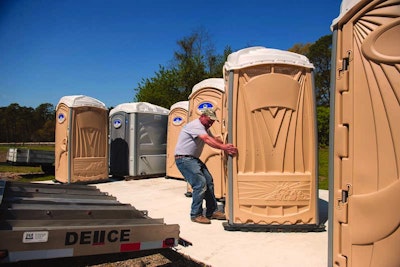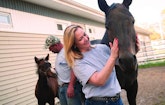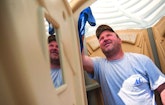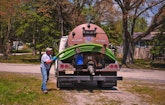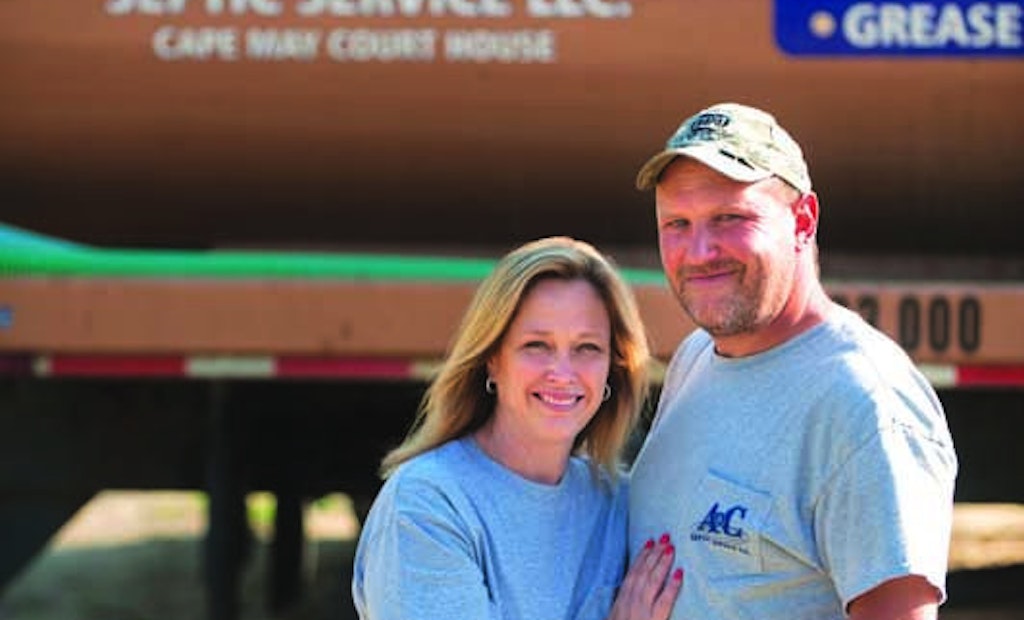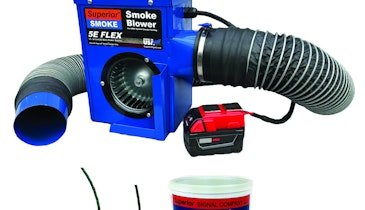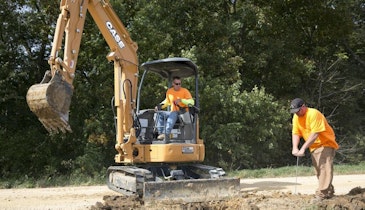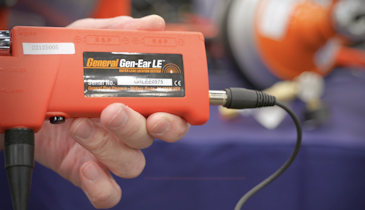Interested in Trucks?
Get Trucks articles, news and videos right in your inbox! Sign up now.
Trucks + Get AlertsAs owners and the sole workers at A & C Septic Service, Jon and Cheri Errico often have their hands full serving the coastal peninsula at the southern tip of New Jersey. But that doesn’t deter their commitment to keeping customers – and potential customers – fully informed about the need to maintain and pump their onsite systems in Cape May County.
On their website and in all of their marketing materials, the Erricos encourage the public to call them not only for service, but for information about how septic systems operate. And when customers call, they reach Jon or Cheri any time, day or night. The Erricos say being accessible to the public is the key to building the business Jon took up as a part-time owner while working as head plant mechanic at the Cape May County Municipal Utilities Authority wastewater treatment facility.
YOU CALL, WE ANSWER
“Any time you call, you’ll get us answering the phone,” Jon says. “People see that invitation to call on our website and they do it.” One time the phone rang at 2 a.m., and Jon anticipated an emergency call from someone whose system was backing up into the home. Instead, he talked to a woman who had a variety of questions about septic systems and how to keep them operating properly. Jon says he answered her questions as best he could even though he learned early in the call that the woman “wasn’t even in our area.”
Customer education is so important because many homes in the Cape May area are owned by former city dwellers from Philadelphia who have retired to the slower-paced life in rural New Jersey, Cheri says. Homeowners accustomed to city utilities learn having a septic system requires more attention. Cheri finds herself explaining the basic details of septic systems over and over.
Jon says younger families can also run into trouble with their septic systems. “Overuse is a big thing,” he says. “A lot of people in the house taking long showers and using the restrooms can overload a system.” He also says people who don’t have their system serviced on a regular basis face the prospect of serious problems.
“They have the attitude that ‘if it ain’t broke, don’t fix it.’ But that can just end up costing them more.”
From the beginning the Erricos decided against using an answering service or voice mail. That applies even if the Erricos are out for the evening or traveling out of town on vacation or at a trade show. When they are away from home and office, the business calls are forwarded to their cellphones.
“We were going out to dinner one night for her birthday, and we were just driving into the parking lot when we got an emergency call,” Jon says. He explained the customer’s problem to Cheri as he turned back out of the parking lot and headed home to his trucks. “All I could say was, ‘Sorry, hon. Happy birthday.’”
“That’s where our loyalty to the business falls,” Cheri adds. “When we took on this endeavor full time and he left his job it had to absorb a lot, so we have to be committed to it.”
While out of town, the couple schedules customer appointments for when they return. If an emergency call comes in, Jon has several friends he can call to take one of his trucks and handle the situation.
STARTING OUT
The idea of operating a pumping business came over time as Jon observed septic service trucks off-loading their contents at the Cape May County MUA treatment facility. Many of the trucks were not local, and Jon says he decided that “if these trucks are coming in from outside the county, then there must be work out there.”
Jon began looking for an opportunity to get into the septic service business, and in 2006 he partnered with the owner of an onsite system installing business to buy a small pumping operation. In the beginning, Jon continued to work at the treatment plant while splitting the septic service duties with his partner. Over time, Jon’s partner needed to devote more time to his installer business.
“In 2011 I had an opportunity to buy him out, and pretty soon I was working both jobs full time,” Jon says. “It just got to the point where I was working sunup to sundown every day.”
While Jon was handling the work in the field, Cheri was overseeing the office, a role she was prepared to assume after years of helping in the office of the general contracting business run by her parents, Mary and Joseph C. Ruffing. Cheri’s brother took over that business when their father died, but her mother, now 80, continues to run the office and do the bookkeeping. Cheri was 10 years old when she began answering the phones to help her mother and says, “I learned all my bookkeeping from her, along with all it takes to keep the business running smoothly. She is an extremely skilled businesswoman.”
Jon continued working two jobs – plus weekends – for two years before he and Cheri decided he would leave the security of the treatment plant job and rely solely on the income from A & C. It was a big step, but one they were ready to take.
EQUIPMENT CORNER
The pumping fleet at A & C includes two Ford-based vacuum trucks, a 1998 Louisville with a hydraulic lift built out by Pik Rite Inc., and a 2006 Sterling built out by Trident Industrial LLC. Both trucks have 2,000-gallon steel tanks and Jurop/Chandler pumps.
Running two trucks in a one-man pumping operation offers flexibility and added capacity during the busy season, Jon says. He’ll fill a truck, then park it while using the other truck to continue servicing customers.
The couple then decided to expand the business by adding portable restrooms. The couple had looked over all the restroom choices at a Water & Wastewater Equipment, Treatment & Transport (WWETT) Show and decided they would be a good fit.
For the portable restroom operation, the Erricos invested in a 1998 Chevy dually pickup equipped with a 300-gallon waste/125-gallon freshwater KeeVac slide-in vacuum tank and Conde pump (Westmoor Ltd.). For the delivery of portable restrooms, the company uses an F.M. Manufacturing Deuce unit that slides into his receiver hitch and carries two units.
A & C owns 32 Aspen units from Five Peaks as well as two Five Peaks Summit handicapped units and one flushable unit with sink from Satellite Industries. To keep his units in the field clean and fresh, Jon says he uses cleaners and deodorants from both J & J Chemical and Surco Portable Sanitation Products.
GROWING THE PORTABLES
Jon says the portable restrooms have boosted revenues and helped bolster the traditionally slow period from late January through March. “It gets us over the winter. When things get slow, the portables are still out there. Each year during those two stalled months, there’s been a steady increase in business, thanks to them.”
Because of a strong response to portable sanitation offerings, Jon says he is aggressive about keeping his supply large enough to meet demand. “When they all go out, then I buy more,” he says.
Early demand for restrooms came from the construction industry. Builders still drive growth, but the Erricos also keep some in the inventory for special occasion rentals as well as for seasonal customers.
“We have a couple of farmers markets locally, and we’ve got a lady with a gallery who is a good client,” says Jon, who handles restroom placement and cleaning chores.
As well as the portable restroom business has gone, septic service is still A & C’s mainstay. Although municipal sewers are expanding their reach in the Cape May region, Jon says there are still many homes and businesses throughout the area using decentralized wastewater systems, and there is no shortage of demand for their services. He counts a number of small businesses among his clientele and, because southern Cape May is a recreational destination, he services a number of campgrounds regularly.
SMALL SIZE, BIG SERVICE
In addition to some of the outside companies whose trucks piqued Jon’s interest in the industry, local competition includes one operator that handles “a major share of the market.” Two other local competitors are like his former partner, running one truck each in addition to operating installing businesses.
Because he is smaller than his primary competition, Jon says he focuses on quality of service rather than being a low-price leader. For the Erricos, consumer education is a path to long-term success. The key is stressing maintenance and helping customers keep their systems at peak performance, he says. Cheri follows the same principles when customers call the office to request service.
The couple says promoting regular pumping intervals helps build business, but it also gives customers the confidence that they will avoid emergencies they may have experienced in the past.
As a final touch, Jon says he makes sure he leaves no trail. “When I leave, you can’t even see where I’ve been.” That approach extends to portable sanitation. “I clean all of those units like they’re my own bathroom.”
Horsing around
Jon and Cheri Errico took their first plunge into small business when they became partners in A & C Septic Service in Cape May Court House, New Jersey, in 2006.
Two years later, the couple followed a second path when they started their own horse breeding business.
Cheri is no newcomer to the stables. The couple’s two quarter horse broodmares are stabled in a barn built by her father four decades ago, and Cheri’s love of horses goes back to her childhood.
Cheri’s father, Joseph C. Ruffing, was a general contractor, and he built his own barn as his then 8-year-old daughter began pursuing her dream of raising horses. She says her parents loved horses but never bred or raised them. Even so, they always supported her. “I am forever grateful. The sacrifices they both made are endless.”
In a way, the pursuit of her dream also led Cheri to the altar. She and Jon actually met through several horse events they were both involved with.
“It was a natural fit when we got together, and our horse business has flourished because of it. People in the horse world will tell you that if you don’t have a partner with the same passion for horses it will never work out. I am happy to say it’s worked out very well.”
One of the Erricos’ mares delivered a foal born March 5 sired by a world champion stallion, Batt Man. Their other mare is due later this year, and they have a yearling foal stabled in Florida as they try to market it. They focus on breeding Western Pleasure horses and are active members of the American Quarter Horse Association and the National Snaffle Bit Association.
Cheri says their decision to keep the equine operation limited in size is similar to their approach to the septic service business. “Again, we want to keep quality by keeping ourselves directly involved in the business.”
She says the couple’s operations are obviously “two very different businesses,” but she notes that there are similar demands for marketing, customer service and good business practices.
